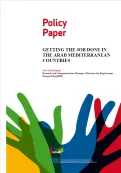Getting the job done in the Arab Mediterranean Countries

SAHWA Policy Paper nº. 15
ISSN 2564-9167
Tackling unemployment worldwide, in particular youth unemployment, represents one of the biggest challenges of our time. The Middle East and North Africa (MENA) region, and in particular the Arab Mediterranean countries (AMCs), has the world’s youngest demographic, but also its highest youth unemployment rates. Millions of young people find themselves out of a job, with youth unemployment rates more than double the global average. This significantly hampers economic growth, stability and development. While there are several factors behind such high levels of youth unemployment, including demographic, urbanisation, political, economic and social trends, one that stands out is the fact that education in these countries does not lead to employment. In fact, unemployment is often higher among the more educated. The demand for modern skills is increasing, but the region’s educational systems have still not evolved fast enough to prepare students to join an increasingly competitive market. This skills mismatch is aggravated by social and gender divides, with youths from marginalised socioeconomic backgrounds, especially women, being particularly affected.
Addressing the problem of youth unemployment in the AMCs requires a concerted effort by all stakeholders. Matching the job needs will require a combination of permanently high economic growth and political, economic, social and educational reforms, but also more investments in programmes aimed at dovetailing job seekers’ qualifications with the needs of businesses, so as to place unemployed youth in available jobs. Public, private and civil society cooperation is fundamental.
With changes afoot in the region, there is an opportunity to establish the foundations for sustainable economic growth and development. This Policy Paper offers recommendations for EU policymakers, governments in the region, businesses and NGOs that can be translated into measures geared towards harnessing all of the region’s potential to “get the job done” in the Arab Mediterranean countries and provide the youth with the necessary opportunities to succeed.